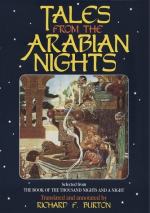[FN#173] Arab. “Akh al-Jahalah” = brother of ignorance, an Ignorantin; one “really and truly” ignorant; which is the value of “Ahk” in such phrases as a “brother of poverty,” or, “of purity.”
[FN#174] Lane (ii. 1) writes “Abu-l-Hasan;” Payne (iii. 49) “Aboulhusn” which would mean “Father of Beauty (Husn)” and is not a Moslem name. Hasan (beautiful) and its dimin. Husayn, names now so common, were (it is said), unknown to the Arabs, although Hassan was that of a Tobba King, before the days of Mohammed who so called his two only grandsons. In Anglo-India they have become “Hobson and Jobson.” The Bresl. Edit. (ii. 305) entitles this story “Tale of Abu ’l Hasan the Attar (druggist and perfumer) with Ali ibn Bakkar and what befel them with the handmaid (=jariyah) Shams al-Nahar.”
[FN#175] i.e. a descendant, not a Prince.
[FN#176] The Arab shop is a kind of hole in the wall and buyers sit upon its outer edge (Pilgrimage i. 99).
[FN#177] By a similar image the chamaeleon is called Abu Kurrat=Father of coolness; because it is said to have the “coldest” eye of all animals and insensible to heat and light, since it always looks at the sun.
[FN#178] This dividing the hemistich words is characteristic of certain tales; so I have retained it although inevitably suggesting:—
I left Matilda at the U-
niversity of Gottingen.
[FN#179] These naive offers in Eastern tales mostly come from the true seducer—Eve. Europe and England especially, still talks endless absurdity upon the subject. A man of the world may “seduce” an utterly innocent (which means an ignorant) girl. But to “seduce” a married woman! What a farce!
[FN#180] Masculine again for feminine: the lines are as full of word-plays, vulgarly called puns, as Sanskrit verses.
[FN#181] The Eastern heroine always has a good appetite and eats well. The sensible Oriental would infinitely despise that maladive Parisienne in whom our neighbours delight, and whom I long to send to the Hospital.
[FN#182] i.e. her rivals have discovered the secret of her heart.
[FN#183] i.e. blood as red as wine.
[FN#184] The wine-cup (sun-like) shines in thy hand; thy teeth are bright as the Pleiads and thy face rises like a moon from the darkness of thy dress-collar.
[FN#185] The masculine of Marjanah (Morgiana) “the she coral-branch ;” and like this a name generally given to negroes. We have seen white applied to a blackamoor by way of metonomy and red is also connected with black skins by way of fun. A Persian verse says :




